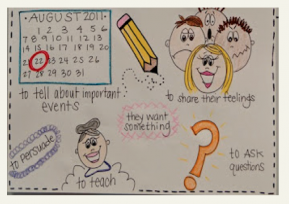About
Why authors create

OVERVIEW
Young children are constantly making inferences from the world around them, using information and ideas from mass media, digital media, and popular culture. When young students start to identify purpose, genre and and target audience in popular culture texts, they practice the kind of inference-making that helps them be better readers and writers. Inference-making is an essential component of reading comprehension. This activity uses 3 resources, available at the bottom of this page.
Children understand that texts are powerful because they inform, entertain and persuade. They also understand that authors have powerful voices. When students have a chance to experience conversations, dialogues, and critiques with authors of books, movies, music, or websites, they gain confidence in their own authorship and see firsthand what their powerful voices can do in the world.
ACTIVITY: Making Inferences about the Purpose of a Media Message
1. Start with Experience. Play "TV Sort" by introducing 3 purposes of media messages using the TV Card Sort Task. Young children learn best by manipulating materials. You may want to download the TV Sort Cards and make one color copy of the complete set of images. Children enjoy holding the images when talking about them. Alternatively, you can display the images on a data projector for learners to view and discuss.
For young learners, you might begin by asking children to tell you about the images that are familar and recognizable. You might be surprised by their answers! They might know more about some of these TV shows than you do. Explain that every TV show is created by a team of authors who work together.
Author: Someone who creates a media message. Authors might be writers, artists, photographers, musicians, directors, animators, producers, or programmers
Audience: Someone who experiences the work of an author. Audiences read, watch, listen to, play with, and use lots of different kinds of media.
Authors always have a purpose in communicating:
TO INFORM. When you inform, you provide information that people want or need.
TO PERSUADE. When you persuade, you try to convince someone to think, feel, or do something.
TO ENTERTAIN. When you entertain, you try to create an intense mood or feeling that attracts and holds people’s attention.
Learners can make guesses about the purpose of one of the TV shows represented. It's important to give reasons to support answers. Ask "why" questions to promote good reasoning and self-expression.
2. Explore Examples to Consider Adaptation to Learners and Contexts. View The Media House and observe a classroom where young children explore how different types of media have different purposes. Some messages can have multiple purposes, as when a movie both entertains and informs. Many young children will spontaneously introduce the concept of genre when talking about the purpose of a message.
Genre: Categories of media that lots of people recognize. When you watch TV, you know some categories right away: Some shows are reality shows, some are cartoons, some are crime shows, and still others are news, commercials, or sports. When you read books, you may enjoy fiction, non-fiction, picture books, chapter books, and more. When you listen to music, you may enjoy pop, rock, hip hop, country, gospel, folk or other types of music.
3. Compose, Create and Take Action. Watch Q & A with Kids & Filmmaker to see a group of children who have viewed a YouTube video created by African-American filmmaker, Barry Jenkins. See how Barry Jenkins responds to their questions. You may want to select a YouTube video and replicate this activity by asking children to generate questions. By videotaping and sharing these, you may be lucky enough to have a filmmaker respond to children's questions. Such activities help children recognize the power of communication to connect authors and audiences.
GUIDED QUESTIONS FOR REFLECTION
Why is it important for people to make inferences about an author's purpose?
When people make infererences about media messages, they may use clues from the text, the context, or their own personal experiences as evidence to support their interpretations. Why is it important to use a combination of clues?
Some people may wonder why authors would take the time to reach out to communicate with young children. Why might some authors respond to children's questions? Why might some authors not respond? Would Q&A with Kids & Filmmaker still have been a valuable learning activity if the filmmaker had not responded? Why or why not?




